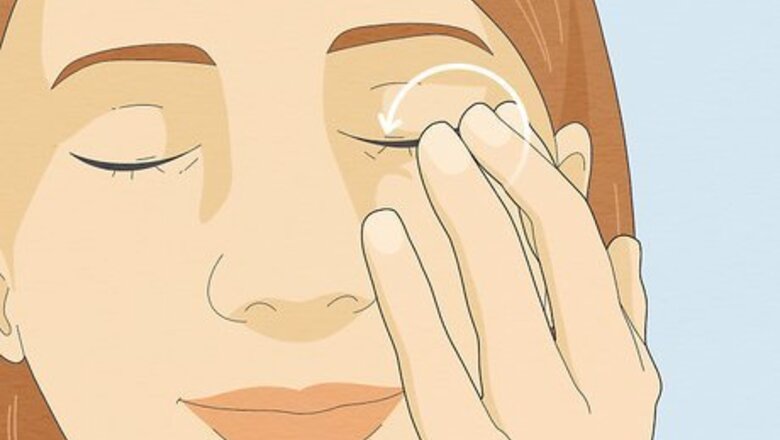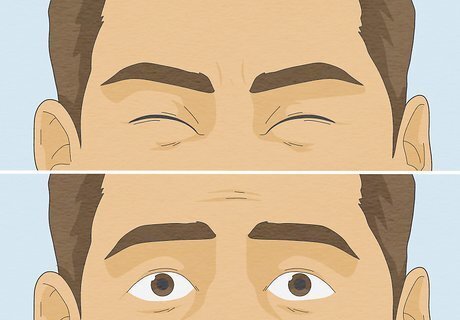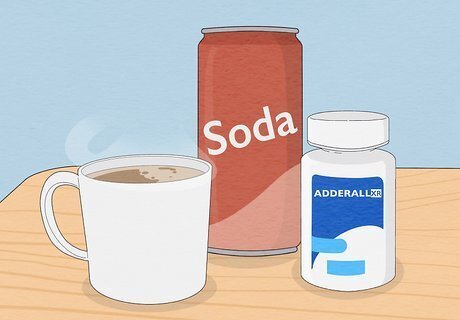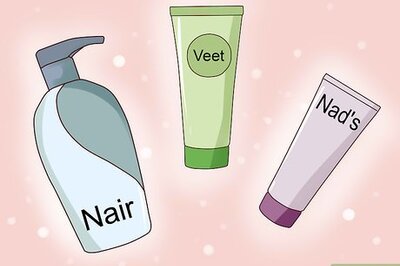
views
- Use eye drops or put a warm compress over your eye to temporarily relieve your eye twitch.
- Get at least 7-8 hours of sleep every night, de-stress, stay hydrated, and don’t overdo it with the caffeine or alcohol.
- Eye twitching is a common side effect of medication, but it’s usually just a sign you’re tired, stressed out, or staring at screens for too long.
- See a doctor if you experience any additional symptoms, like swelling or double vision, or if your twitch won’t go away.
Massage the area.

Gently rub your eye and the muscles surrounding it. Use 2-3 fingers to lightly rub your eye. Then, massage the muscles and skin around your eyebrow and cheek. Do this for 30-60 seconds and see if the twitching stops. Like any part of your body, the tiny muscles and nerves around your eye can get irritated or knotted. A massage might help your eyes relax and make your eye stop twitching immediately. Ever had your foot fall asleep or get a knot in your back? A twitchy left or right eye is a similar type of issue.
Try blinking really hard.

If strain is the cause of your twitch, blinking may fix things. Shut your eyes as tight as you can. Then, open them up as wide as possible. This flexes the muscles around your eyes. If you’ve got some kind of muscle strain, this is the facial equivalent of stretching it out! If your eye twitches when you’re looking at a screen for a long period of time, you probably aren’t blinking often enough. Take more breaks and try to remember to blink more often.
Put a warm compress on your eye.

A little heat will soothe your eye muscle and stop the twitching. Grab a heating pad and turn it to the lowest setting possible. Leave it on your eye for 5-10 minutes at a time and take frequent breaks. The heat will help your eye muscles relax and put an end to the twitching. If you don’t have a heating pad, soak a clean cloth in warm water and use that.
Use eye drops.

Your eye may be twitching because it’s dry and irritated. If you’ve been around dust, you have allergies, or you’ve just been up for a while, you may need to lubricate your eyes. Grab any commercial eye drop, tilt your head back, and apply 2-3 drops directly to your eyeball. Your twitching may stop immediately! If you find yourself needing to use eye drops regularly, see your doctor. Persistently dry eyes are a sign you may have an underlying medical condition.
Get more sleep.

If you aren’t getting 8 hours of sleep a night, start now. Rest is one of nature’s best remedies. General fatigue can lead to dry, tired eyes and result in more occurrences of eye twitching. Try to get a full 7-8 hours of sleep each night. Also, limit your use of electronic screens such as TVs, mobile devices, and computer screens leading up to bedtime, since those can mess with your sleep cycle. Improve your sleep hygiene by going to bed and waking up at the same time every day and blocking all light out of your room. Regular exercise helps, too! If the twitching is going on right now and you’re tired, take a nap!
Cut back on the caffeine and alcohol.

Stick with water to see if that fixes your twitch. Both caffeine and alcohol can irritate your facial muscles if you consume too much. Alcohol dehydrates you, which is a common cause of muscle spasms, while caffeine naturally makes people twitchy. Try taking it easy with the coffee, tea, and/or alcohol. Your twitch will likely go away on its own. Stimulants, like Adderall, can also cause an eye twitch if you don’t take the prescription as directed.
Find some stress reduction.

Stress and anxiety release neurotransmitters that cause twitching. If you’ve got a lot on your plate, finding a way to relax and engage in some self-care will not only minimize your twitching, but help you deal with the stress in your life. You might take up yoga or learn to meditate. On top of that, try to set aside some time every day to pursue your hobbies and do things you enjoy. Regular exercise helps dramatically. If you can get active, run, or play sports, you’ll find it a lot easier to cope with stress.
Drink plenty of water

Dehydration can cause your muscles to tighten up. Stay hydrated by drinking plenty of water. Aim to drink 11.5-15.5 cups (2.7-3.7 L) of water every day to keep your body healthy and happy. If you notice your eye twitches often after heavy workout sessions or when it’s hot out, you likely need to drink more water.
Check your medications.

Eye twitching is a common side effect of a bunch of different meds. If you’re taking prescription medication, ask your doctor if any of them could be causing eye twitching. This is a surprisingly common side effect, and your doctor may be able to offer an alternative medication that won’t make you twitch. This is a common side effect for a lot of epilepsy and Parkinson meds. Certain migraine medications can also cause your eye to twitch.
Ask a doctor about botulinum toxin injections.

If the twitching just won’t go away, ask your doctor about Botox. Uncontrolled eye twitching is called blepharospasm, and it’s extremely common. Luckily, the occasional botulinum toxin (Botox) injection can keep your twitches from acting up. Botox will keep the twitching muscle from moving, which will completely prevent your tic from coming back for at least a few months. Botox might sound like kind of a radical remedy to an eye twitch, but these injections are really no big deal. Doctors administer Botox all the time for everything from lazy eye to bladder dysfunction. This is a very mundane procedure these days.
Get medical care if the twitching won’t stop.

Seek help if you experience any other symptoms, as well. Eye twitching is almost always a non-issue, but there are a few reasons to see a doctor if the tic won’t stop. This is especially important if you experience facial weakness, drooping, or your eyes start to turn red. Also, see a doctor if your vision changes at all (i.e. double vision, light sensitivity). It’s probably nothing, but it’s better to be safe than sorry. Common mundane causes of an eye twitch include blepharitis (inflamed eyelids) or hemifacial spasms. In extremely rare cases, the twitching may be a sign of a nerve disorder or a neurological issue.


















Comments
0 comment